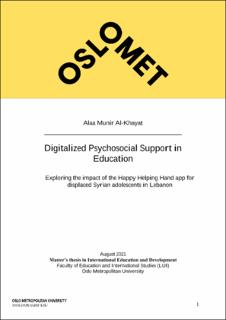Digitalized Psychosocial Support in Education: Exploring the impact of the Happy Helping Hand app for displaced Syrian adolescents in Lebanon
Master thesis
Published version
Permanent lenke
https://hdl.handle.net/11250/2976713Utgivelsesdato
2021Metadata
Vis full innførselSamlinger
Sammendrag
The civil war in Syria has resulted in 1.5 million Syrian displaced people living in Lebanon. About 40% are between the ages of five and seventeen, many of which suffer from a wide range of psychosocial problems. This has created a need for initiatives to provide mental health and psychosocial support (PSS). The use of digital technology has created unique opportunities to provide PSS to underserved populations. One such digital PSS initiative is the Happy Helping Hand (HH) intended to provide PSS in the education of displaced Syrian adolescents in Lebanon. The HH is a digital cognitive behavioral-based (CB-based) tool that aims to help adolescents manage their emotions and understand how to problem-solve through a digital game app. Our research has examined how the Happy Helping Hand (HH) contribute as a digital psychosocial support intervention in improving well-being and emotional problem-solving skills in adolescents. We therefore examined how the HH affected the well-being and emotional problem-solving skills of a group of displaced Syrian adolescents in Lebanon. We also explored the adolescents’ and teachers and PSS staff’s experiences of the usefulness and practicability of the HH app. We employed a mixed-method research approach by combining qualitative and quantitative methods for data collection. A statistical analysis was conducted of the adolescents’ well- being both before (pre-test) and after (post-test) the HH intervention, as well as measuring their experiences of the usefulness of the intervention. In addition, three semi-structured interviews were conducted with adolescents (divided by gender), and teachers and PSS staff facilitating the intervention, exploring issues such as emotional coping and problem-solving skills, and their experiences using the HH app. We found that the Happy Helping Hand positively affected Syrian displaced adolescents’ well-being. Our results are in line with research showing that digital PSS interventions can increase emotional problem-solving skills by improving skills in emotional self-management, decision-making, and help-seeking. The Happy Helping Hand was considered to be easy to use, engaging, relevant, crucial, and useful. Nevertheless, digital PSS interventions should maintain cultural sensitivity and adapt itself to the relevant cultural context but should do so without compromising on efficacy nor undermine international rules, norms, and standards. The well-being of the Syrian adolescents is adversely affected by multiple other stressors, such as war trauma, poverty, and tough living conditions. Importantly, more than digital PSS is needed to ensure wellbeing and healthy lives for all refugees.
